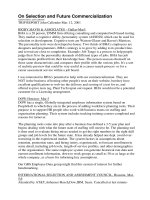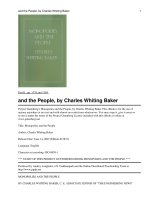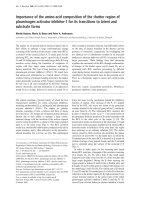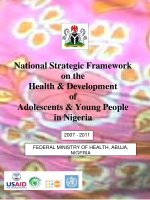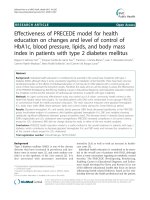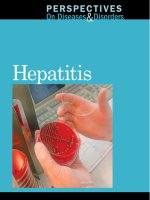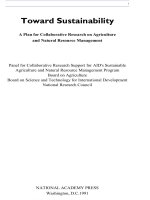Guidance for public authorities on consulting and involving children and young people pdf
Bạn đang xem bản rút gọn của tài liệu. Xem và tải ngay bản đầy đủ của tài liệu tại đây (400.15 KB, 120 trang )
Guidance for public authorities on consulting
and involving children and young people
Let’s TalkLet’s Talk
Let’s ListenLet’s Listen
Equality Commission for Northern Ireland
Let’s talk, let’s listen
Guidance for public authorities on consulting
and involving children and young people
We can provide copies of this guidance in other formats, such as
in large print, Braille, on audio cassette and on disk. You can also
download it from our website (see below).
We have also created a child friendly (easy read) version of the
document. This colourful booklet is aimed at younger children and
has been created to raise awareness of children and young
people’s right to be consulted and involved in decision making. A
web accessible version of this child friendly booklet can also be
accessed on our website.
If you would like a copy in another format, please contact us using
the details below.
Equality Commission for Northern Ireland
Equality House
7-9 Shaftesbury Square
Belfast
BT2 7DP
Phone: 028 90 890 890
Fax: 028 90 315 993
Textphone: 028 90 500 589
E-mail:
Website: www.equalityni.org
ISBN: 978-1-906414-10-8
ii
Contents Page
Foreword iv
Section 1 Glossary of terms 1
Section 2 Introduction 9
Section 3 What we mean by consultation 19
Section 4 Identifying the impact (effects) of policies
on children and young people 29
Section 5 Effective consultation with children and
young people 33
Section 6 Strategic planning 61
Section 7 Legal and ethical issues 67
Section 8 Evaluation and monitoring 75
Section 9 Feedback 79
Section 10 Other formats 81
Section 11 Training for public-authority staff 83
iii
continued Page
Appendix 1 Organisations which could provide advice
on consulting children and young people 85
Appendix 2 Useful resources relating to children and
young people in Northern Ireland 91
Appendix 3 Protecting children, vulnerable adults and
vulnerable groups 94
Appendix 4 Access Northern Ireland 98
Appendix 5 Consulting children and young people –
strategic planning checklist for public
authorities 100
Appendix 6 Methods 102
Appendix 7 The particular circumstances of children
in Northern Ireland 104
Appendix 8 Some useful publications 108
iv
Foreword
‘Young people should be at the forefront of global change and
innovation. Empowered they can be key agents for development
and peace. If, however, they are left on society’s margins, all of us
will be impoverished.’
(Kofi Annan, former Secretary General of the United Nations)
When the people framing Section 75 of the Northern Ireland Act
1998 identified age as one of the reasons why equality of
opportunity should be promoted, they did not limit the word in any
way. As a result, it provides lots of potential for public authorities to
creatively and imaginatively shape and introduce policies.
Children and young people are as fully covered by this requirement
of the act as any other age group in the population. They are, on
that account, as fully entitled as everyone else to take full
advantage of its benefits. And that includes taking account of their
views and experiences when policies are being developed.
More than a quarter of the population of Northern Ireland can be
placed into this group. Quite apart from the basic principles of
natural justice, there are practical reasons why their needs and
expectations should be reflected in policies. What a lost opportunity
it would be if such a significant group was left beyond the reach of
the benefits of Section 75.
Policies that affect children and young people can do so in two
ways. They can affect them during their childhood and youth as
they particularly refer to the needs or experiences of that period of
life. More importantly, perhaps, they can also have an effect on the
future, setting the boundaries within which they will live their entire
lives. The challenge is to make sure that, when developing those
policies, public authorities take account of their real, life-shaping
influences for children. There is a constant risk that children and
young people will be affected by these policies, but absent from the
decision-making about important changes that affect them.
Children and young people, of course, do not just have an age –
their identities are much more complicated. They have all the
characteristics of the whole population – they are boys or girls, they
can be well or ill, they are born into a national or ethnic identity,
they may live in a political environment, they will come across
v
different beliefs, and they will grow to have a sexual orientation.
That richness must be a defining element in the way policy and
practice relates to them.
They also have a point of view. They do have a voice. They grow
gradually more articulate with age and education. This is where this
guidance comes in. It aims to help public authorities carry out their
duties to consult directly with children and young people. This can
be a demanding task, as there is a great deal to take into account
in the process. But it is worthwhile. Children and young people
have experiences, they have a real sense of fairness and justice,
and they have a valid and genuine interest in those policies that
affect their futures.
Consulting young children presents special challenges. But we
should not underestimate their capacity to contribute to an
understanding of policies and practices. At the centre of
consultation is the need to listen to what children have to say about
matters that affect them and to take those views into account.
Public authorities must move beyond any stereotypes of children’s
range of interests, recognise the sophisticated view of the world
that children can offer, and appreciate the effects that a wide range
of policies has on their lives.
I want to thank everyone, especially the children and young people,
who helped us develop this guidance, and I recommend that public
authorities give it their full attention.
Bob Collins
Chief Commissioner
Equality Commission for Northern Ireland
1
1 Glossary of terms
There are some terms and phrases throughout this document
which you may not be familiar with. We have explained these
below.
Active citizenship
An active citizen is one who exercises both their rights and
responsibilities in a balanced way.
Active participation (or ‘actively taking part’)
In this guidance, ‘active participation’ means not only engaging with
children and young people when developing policies, but also
allowing them to take part in decision-making when developing and
planning policies.
Children’s rights impact assessment
Children’s rights impact assessments (CRIAs) have been used to
assess how a public authority’s policy decisions (whether you are
making a new policy or amending an existing one) can affect the
welfare of children and young people. Whether you or a governing
body carry out these assessments, they aim to prompt you to
review and revise your decisions or proposals, to better take
account of the interests and needs of children and young people.
Consultation
In this guidance, ‘consultation’ means asking those people who are
affected by a policy (that is, the people who use the service, staff,
the general public) for their views on how the policy could more
effectively provide equality of opportunity. Different circumstances
will call for different types of consultation. Consultation could, for
example, include meetings, focus groups, surveys and
questionnaires.
Easy Read
Easy Read is a way of writing that is particularly useful for
communicating effectively with children under 10 years old and
children and young people who have learning disabilities.
Easy Read documents should have:
easy words;
big writing; and
pictures.
2
The Disability Rights Commission and MENCAP have produced
guides to Easy Read.
Engagement
In this guidance, ‘engaging’ with children and young people means
forming a longer-term relationship with children and young people
to be able to consult them in the future.
Equality impact assessment (EQIA)
This is where existing and proposed policies are assessed to find
out whether they have an adverse impact (negative effect) on
equality of opportunity for the relevant groups. An EQIA also offers
an opportunity to identify how better to promote equality of
opportunity and good relations.
Equality scheme
This is a document which sets out your arrangements for carrying
out your duties under Section 75. An equality scheme must include
an outline of your arrangements for carrying out consultations,
screening, equality impact assessments, monitoring, training and
arrangements for making sure information and services are
available to everyone who needs them.
Equality of opportunity
Providing ‘equality of opportunity’ involves preventing discrimination
against people because of certain characteristics they have, such
as their sex, race, age, marital status, disability, religious beliefs,
political opinions, dependants and sexual orientation.
However, promoting equality of opportunity involves more than just
preventing discrimination. It gives you a duty to take proactive
measures to provide equality of opportunity between the categories
identified under Section 75 of the Northern Ireland Act 1998.
Good relations
Although not defined in the law, we have agreed the following
definition of ‘good relations’.
‘The growth of relationships and structures for Northern Ireland that
acknowledge the religious, political and racial context of this
society, and that seek to promote respect, equity and trust, and
embrace diversity in all its forms.’
3
Monitoring
Monitoring means continuously examining and assessing a policy
to see how it affects the categories identified under Section 75 of
the Northern Ireland Act 1998. Monitoring must be sensitive to the
issues associated with human rights and privacy. When setting up
monitoring systems, you should ask for advice from both the people
you consult and the Section 75 representative groups.
Monitoring involves collecting relevant information and evaluating
policies. However, it is not just about collecting information – it can
also involve holding regular meetings and reporting on the research
the authority has carried out. Monitoring provides the information
used in the next cycle of screening (see ‘Screening’ below).
Non-governmental association (NGO)
Any local, national, or international organisation – whether or not it
works to make a profit – set up to achieve particular social aims or
serve particular areas, and whose members are not employed by a
government.
Northern Ireland Commissioner for Children and Young
People
The Northern Ireland Commissioner for Children and Young
People's main aim is to ‘safeguard and promote the rights and best
interests of children and young persons’. The Commissioner does
this by:
promoting children’s rights and developing fun ways of
communicating with young people and encouraging them
to take part in decisions;
dealing with individual complaints from children and
young people (or their parents and guardians) about
government services like education, health, adoption and
fostering, youth justice and road safety; and
carrying out research into issues that are affecting
children and young people, and, if necessary, holding
inquiries into issues where the Commissioner believes
children are being negatively affected. The Commissioner
must also review the ways in which the organisations
providing services for children listen to complaints and
take account of children’s views.
4
Northern Ireland Human Rights Commission
A body set up under Section 69 of the Northern Ireland Act 1998,
which works to make sure that the human rights of everyone in
Northern Ireland are fully protected in law, policy and practice.
Northern Ireland Network for Youth
The Youth Council Northern Ireland is currently consulting on
proposals to develop a Northern Ireland Network for Youth. While
this is currently at an early stage of development, we believed it
was important to refer to this ongoing project in this document. The
Ten Year Children and Young People’s Strategy for Northern
Ireland refers to a forthcoming initiative, which has been
provisionally titled Northern Ireland Network for Youth (NINFY).
The aim of NINFY will be to allow all children and young people (up
to the age of 25) to have their say in all relevant areas of
government policies.
At the time this document was published, detailed consultation was
under way to explore possible options for NINFY, and to make sure
that it fits within a clear and logical participation system for children
and young people. The Department of Education is carrying out this
consultation. Once NINFY is up and running, it will offer significant
support to existing structures, aiming to create real and meaningful
relationships between children and young people and
policymakers.
Participative democracy
‘Participative democracy’ is when citizens play an active role in
social, civil and political life, through being directly involved in
decision-making processes about specific issues. It works
alongside ‘representative democracy’, by giving more power to
citizens and organisations that work in the public’s interests.
Participative democracy also aims to provide citizens with
opportunities to make meaningful contributions to decision-making.
5
Plain English
Writing that the intended audience can read, understand and act on
the first time they read it. Plain English takes account of design and
layout as well as language. Plain English is needed in all kinds of
public information, such as forms, leaflets, agreements and
contracts. As a rule, you should use plain English in any
information the public rely on when they make decisions. Plain
English Campaign have made available a free guide called ‘How to
write in Plain English’ (see www.plainenglish.co.uk/howto.pdf) and
also provide a range of guides with advice on writing in specific
situations.
Pre-consultation
Gathering information and views from a range of important
stakeholders on a particular policy before the formal consultation
stage, to identify important issues and sources of useful
information.
Screening
The procedure for identifying which policies will go through a
equality impact assessment, and how these impact assessments
will be prioritised. The purpose of screening is to identify which of
your policies are likely to have a significant effect on equality of
opportunity, so that you can use most of your resources to improve
these policies. Screening also involves regularly reviewing your
existing and proposed policies. For each policy, you should
consider the following questions.
Is there any evidence that certain groups are actively
taking part in your work more than others?
Is there any evidence that different groups have different
needs, experiences, issues and priorities in relation to the
particular policy?
Have previous consultations with relevant groups,
organisations or individuals shown that particular policies
create problems that are specific to them?
Is there an opportunity to better promote equality of
opportunity or good relations by changing the policy or
working with other people in the Government or in the
larger community?
6
Schedule 9
Schedule 9 of the Northern Ireland Act 1998 sets out detailed
requirements for enforcing the Section 75 duties, including an
outline of what should be included in an equality scheme.
Section 75
Under Section 75 of the Northern Ireland Act, public authorities,
when carrying out their functions relating to Northern Ireland, must
‘have due regard’ to the need to promote equality of opportunity
between:
people of different racial groups, ages, marital status and
sexual orientation;
people who have different religious beliefs or political
opinions;
men and women generally;
people who have disabilities and people who don’t; and
people who have dependants and people who don’t.
‘Having due regard’ means a public authority has a legal duty to
take these matters into account, when assessing the need to
promote equality of opportunity between the categories of people
set out in Section 75(1) of the Act.
Public authorities must also ‘have regard to the desirability’ of
promoting good relations between people of different religious
beliefs, political opinions or racial groups. ‘Having regard to the
desirability’ means that public authorities must consider how the
policies it makes affects the relationships between people
belonging to these groups.
Social capital
‘Social capital’ refers to the ‘collective value of all “social networks”
and the inclinations that arise from these networks to do things for
each other’ (see note 1 at the bottom of the page). It has been
identified as an important part of building and maintaining
democracy, through increasing trust and encouraging active
participation. There are two types of social capital – ‘bonding’ social
capital and ‘bridging’ social capital. ‘Bonding’ refers to the value of
social networks between similar groups of people, while ‘bridging’
Notes
1 Putnam, Robert (2000), ‘Bowling Alone: The Collapse and Revival of American
Community’ (New York: Simon and Schuster).
7
refers to the value of social networks between socially different
groups.
Social inclusion
‘Social inclusion’ is the process by which efforts are made to make
sure that everyone, regardless of their experiences and
circumstances, can achieve their potential in life.
United Nations Convention on the Rights of the Child
The United Nations Convention on the Rights of the Child
(UNCRC) is a set of basic rights that children have under
international law. The UK Government has signed up to this
convention.
8
9
2 Introduction
This section sets out the legal background, the purpose of the
guidance and why it is important to consult children and young
people.
2.1 Under Section 75 of the Northern Ireland Act, public
authorities, when carrying out their functions relating to
Northern Ireland, must ‘have due regard’ to the need to
promote equality of opportunity between:
people of different racial groups, ages, marital status and
sexual orientation;
people who have different religious beliefs or political
opinions;
men and women generally;
people who have disabilities and people who don’t; and
people who have dependants and people who don’t.
‘Having due regard’ means public authorities have a legal
duty to take these matters into account when assessing the
need to promote equality of opportunity between the
categories of people set out in Section 75(1) of the Act.
Public authorities must also ‘have regard to the desirability’
of promoting good relations between people of different
religious beliefs, political opinions and racial groups. ‘Having
regard to the desirability’ means that public authorities must
consider how the policies they make affect the relationships
between these groups.
2.2 Under Schedule 9 (1) of the Northern Ireland Act 1998, we
have a duty to:
a review how effectively you are keeping to your duties
under Section 75; and
b offer advice and guidance to you and other organisations
that have these duties.
10
2.3 We have developed this guidance with the support of a
project advisory group, made up of government departments,
the NI Commissioner for Children and Young People, the NI
Human Rights Commission and members of the children and
young person’s non-governmental organisations (NGO)
sector. There are more details about the methods we used to
develop this guidance in appendix 6.
Purpose of the guidance
2.4 You have a duty, by law, to meet the requirements set out in
Section 75 of the Act.
2.5 Under Schedule 2 of the Northern Ireland Act 1998, we must
make sure you carry out your duties under the Act, and offer
advice to you and other organisations that have these duties.
2.6 We have identified the need to provide advice, guidance and
training for public authorities who are affected by the Section
75 duties. This guidance sets out what you need to do to
consult children and young people under these duties, and
offers advice on how best to do so.
2.7 The guidance aims to help you carry out these duties
effectively, specifically in terms of how you should consult
children and young people direct. The guidance also aims to
allow you to go further than just carrying out your duties, by
helping you to develop best practice.
2.8 For the purposes of this guidance, we define ‘children’ as:
children who are aged under 18; and
children who are aged under 21 (if disabled or leaving
care).
This is the definition set out under article 3 (1) of the Northern
Ireland Commissioner for Children and Young People
(Northern Ireland) Order 2003.
11
2.9 The aims of the guidance are to:
set out why it is important for you to consult children
and young people;
explain what we mean by ‘consultation’, ‘engagement’
and ‘active participation’;
provide guidance on how you can identify the effects of
your policies on children and young people;
identify the problems preventing public authorities from
consulting children and young people, and to set out
ways in which you can overcome them;
provide advice on how you should include the duty to
consult children and young people in the strategic
planning process; and
help you to identify other issues which you need to take
into account when you consult children and young
people, including confidentiality and ethics, monitoring
and assessment, feedback, providing information in
other formats, and training.
2.10 This guidance builds on, and is meant to be read with, the
consultation guidelines in our ‘Guide to the Statutory Duties’
(referred to throughout this guidance as ‘the Guide’).
2.11 We have also taken account of the ‘Practical Guidance on
Equality Impact Assessment’ (referred to throughout this
guidance as the ‘Practical Guidance’).
2.12 Schedule 9 (4) (2) (b) of the 1998 Act gives your organisation
a duty to assess and consult on the likely effects of the
policies you have put in place (or plan to put in place) to
promote equality of opportunity. As a result, you must consult
children and young people across the nine categories listed
under Section 75 (1) to ask for their views on how a particular
policy may affect them.
12
2.13 You should aim to form relationships by encouraging the
groups and individuals affected by your policies to actively
take part in your work. Consulting children and young people
could benefit other initiatives to encourage active citizenship,
involve children and young people in the democratic process
(public affairs, elections and so on) and help you to meet your
human-rights responsibilities. This guidance sets out the
ways in which you can benefit from consulting children and
young people.
2.14 We recommend involving children and young people as a
matter of best practice. This guidance gives you advice on
how to consult and engage with children and young people
and encourage active participation.
2.15 This guidance also identifies some issues and problems
which young people believe prevent public authorities from
consulting them in an effective way. It suggests practical
solutions and best-practice methods you can use to consult
effectively and openly with children and young people (see
section 4).
2.16 The guidance provides advice on how to take account of
confidentiality and ethics, as well as the need to provide
information in other formats when consulting children and
young people (see sections 7 and 10).
2.17 The guidance highlights the role of the Participation Network,
which has been funded by the Office of the First Minister and
Deputy First Minister (OFMDFM) to provide a free support
service to local government and government departments
and agencies, to improve how they consult, engage with and
involve children and young people in decision-making.
2.18 The guidance provides details of organisations that can give
you advice on consulting and involving children and young
people (see appendix 1).
2.19 The guidance considers the responsibilities you have under
the Protection of Children and Vulnerable Adults (NI) Order
2003 and the Safeguarding Vulnerable Groups (NI) Order
13
2007, and provides information about how you can use
Access NI to ask for information on a person’s criminal history
(see appendices 3 and 4).
2.20 The guidance takes account of the United Nations
Convention on The Rights of the Child (see note 2 at the
bottom of the page), a set of basic rights that children have by
law. These rights have been approved by the UK
Government, and the most relevant parts of these rights are
referred to throughout this guidance.
(There is, however, a range of other international human-
rights responsibilities which are also relevant to children and
young people. For example, the United Nations Convention
on the Elimination of All Forms of Discrimination Against
Women, the United Nations Convention on the Elimination of
All Forms of Racial Discrimination, the United Nations
Convention on the Rights of Persons with Disabilities, the
Council of Europe Framework Convention on the Protection
of National Minorities and so on.)
Why is it important to consult children and young people?
2.21 According to the Northern Ireland mid-year population
estimates for 2005 (see note 3 at the bottom of the page),
there are a total of 434,780 children and young people under
the age of 18 in Northern Ireland. This is equal to roughly
25.2% of the Northern Ireland population who may want to
contribute to the Government’s planning and decision-
making.
2.22 It makes good business sense for you to take the views of
such a large number of people into account, as this will help
you make sure that you are providing services which are easy
to use, available to everyone and offer value for money.
Notes
2 See www.unhchr.ch/html/menu3/b/k2crc.htm
3 Registrar General Annual Report 2005 – Section 2, Population, Table 2.1: Estimated
Population By Sex and Age, 30 June 2005
14
2.23 In recent years, many public authorities have benefited from
consulting children and young people direct, and those
organisations which play an important role in promoting
children’s rights and their wellbeing. The benefits of doing
this include:
gathering information from children and young people
(as citizens and as customers) about their changing
attitudes and needs, their views about how public
authorities can provide better services, and about the
problems which prevent them from using services;
promoting the idea of ‘social inclusion’ and being able to
develop fresh perspectives and new ideas about
policies and services;
being able to develop policies and practices which
target services for children and young people more
effectively; and
developing more appropriate and effective policies and
services based on actual needs, rather than what you
presume children and young people need.
2.24 To support the idea behind involving children and young
people more effectively in society, local and global citizenship
(after primary school) and citizenship (primary school, as part
of personal development) have been included in the revised
curriculum for Northern Ireland. Consulting children and
young people will help them develop the citizenship skills they
learn as part of their formal education.
2.25 Promoting ways to engage children and young people in
developing a culture of ‘participative democracy’, which
involves negotiation and sharing and values diversity
(people’s differences), is likely to help them become more
aware of both the rights and responsibilities associated with
citizenship.
15
2.26 There have also been a number of legal developments,
strategies and policies which have had a major effect on
children and young people. These include the following.
a Section 75 of the Northern Ireland Act 1998 (and the
guidance that comes with it), which gives you directions on
how to carry out your duties. Children and young people
have particular needs concerning information and to take
part in consultation and decision-making processes,
especially on issues that affect them.
It is particularly important that you consider which methods
are most appropriate for consulting children and young
people. You should also make sure that you provide
information which is clear, easy to understand and in an
appropriate format, to make sure there are no problems
preventing you from consulting children and young people.
You must also recognise the different needs children and
young people have (for example, children who do not
speak English as their first language, children who have
learning disabilities and so on).
As well as the duty to promote equality of opportunity, the
duty to promote good relations (as set out in Section 75 (2)
of the 1998 Act) is also relevant, given the political and
community conflict which has characterised Northern
Ireland and caused poverty and disadvantage for many
children and young people. It is vital that you consult
children and young people when developing policies which
are relevant to good relations, taking account of our
guidance, ‘Promoting Good Relations’.
b The United Nations Convention on the Rights of the Child,
and the growing awareness of these rights among public
authorities, non-governmental organisations (NGOs) and
individuals. Articles 12 and 13 of the Convention are
particularly relevant to consulting children and young
people, as shown below.
16
Article 12 (1)
‘Parties shall assure to the child who is capable of
forming his or her views the right to express those views
freely in all matters affecting the child, the views of the
child given due weight in accordance with the age and
maturity of the child’.
Article 13 (1)
‘…the child shall have the right to freedom of expression:
this right shall include freedom to seek, receive or impart
information and ideas of all kinds, regardless of frontiers,
either orally, in writing or in print, in the form of art, or
through any other media of the child’s choice’.
Article 2 is also relevant, setting out a commitment to:
‘…respect and ensure the rights set forth…to each
child… without discrimination of any kind, irrespective of
the child’s, or his or her parent’s or legal guardian’s race,
colour, sex, language, religion, political or other opinion,
national, ethnic or social origin, property, disability, birth
or other status’.
Article 3 gives you a duty to make sure that ‘in all
actions concerning children, whether undertaken by
public or private social welfare institutions, courts of law,
administrative authorities or legislative bodies, the best
interests of the child shall be a primary consideration’.
c ‘Our Children and Young People: Our Pledge. A Ten Year
Strategy for Children and Young People in Northern
Ireland 2006-2016’ – developed by the Office of the First
Minister and the Deputy First Minister, along with other
government departments – aims to make sure that, by
2016, all children and young people in Northern Ireland
are:
healthy;
enjoying, learning and achieving;
living in safe and stable environments, free from
poverty;
contributing positively to community and society; and
17
living in a society which respects their rights.
d The Youth Council Northern Ireland is currently consulting
children and young people on proposals to develop a
Northern Ireland Network for Youth (NINFY), as set out in
the ‘Ten Year Strategy for Children and Young People in
Northern Ireland 2006-2016’. The aim of NINFY will be to
make sure all children and young people (up to the age of
25) are able to have their say in all relevant areas of
government policies.
e A range of other relevant strategies and policies – for
example:
Lifetime Opportunities (the Anti-Poverty and Social
Inclusion Strategy for Northern Ireland);
The Racial Equality Strategy for Northern Ireland
2005-2010;
The Gender Equality Strategy for Northern Ireland
2006-2016;
The DHSSPS Strategic Framework for Children and
Young People And Families: Families Matter –
Supporting Families in Northern Ireland;
Care Matters – A Bridge to a Better Future.
(This is not a full list, but is meant to provide examples of
some of the strategies and policies in place.)
2.27 The Children Order (Northern Ireland) 1995 brings together
the laws relating to caring and protecting for children. One of
the main principles of the Children Order is that children
should be kept informed about what happens to them and
should be encouraged to take part when decisions are made
about their future.
18
2.28 Most policies and laws can have an effect across society.
Even if a policy appears only to have an effect on adults, it
may also have an effect on children and young people (that
is, if these adults have child dependants). When a policy or
law does not appear to have a direct effect on children and
young people, you must fully consider its indirect effects,
particularly in terms of the different needs children have.
